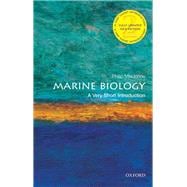
Marine Biology: A Very Short Introduction
by Mladenov, Philip V.Buy New
Buy Used
Rent Book
Rent Digital
Downloadable: 180 Days
Downloadable: 365 Days
Downloadable: Lifetime Access
This item is being sold by an Individual Seller and will not ship from the Online Bookstore's warehouse. The Seller must confirm the order within two business days. If the Seller refuses to sell or fails to confirm within this time frame, then the order is cancelled.
Please be sure to read the Description offered by the Seller.
Summary
In this Very Short Introduction, marine biologist Philip Mladenov provides an accessible and up-to-date overview of marine biology, offering a tour of marine life and marine processes that ranges from the unimaginably abundant microscopic organisms that drive the oceans' food web to the apex predators that we exploit for food; from polar ocean ecosystems to tropical coral reefs; and from the luxurious kelp beds of the coastal ocean to deep-ocean hydrothermal vents where life exists without the energy of the sun. Throughout the book he considers the human impacts on marine life including overfishing, plastic and nutrient pollution, the spread of exotic species, and ocean warming and acidification. He discusses the threats these pose to our welfare, and the actions required to put us on a path to a more sustainable relationship with our oceans so that they can be restored and protected for future generations. Mladenov concludes with a new chapter offering an inspiring vision for the future of our oceans in 2050 that can be realised if we are wise enough to accelerate actions already underway and be bold with implementing new approaches.
The next decade will decide the state of the oceans that we leave behind for future generations.
ABOUT THE SERIES:
The Very Short Introductions series from Oxford University Press contains hundreds of titles in almost every subject area. These pocket-sized books are the perfect way to get ahead in a new subject quickly. Our expert authors combine facts, analysis, perspective, new ideas, and enthusiasm to make interesting and challenging topics highly readable.
Author Biography
Philip Mladenov, Retired Professor of Marine Science, University of Otago, New Zealand
Philip Mladenov has 40 years of professional experience in marine and environmental research, teaching and exploration. Now retired from his position of Professor of Marine Science at the University of Otago, he has authored over 80 scientific papers and a broad range of consulting reports, government reviews, and popular articles. As well as his academic contributions, Philip has worked with government agencies, politicians, and large companies to build awareness and strategic responses to climate change, environmental degradation, and resource over-exploitation.
Table of Contents
Acknowledgements
List of illustrations
List of tables
List of abbreviations
Introduction
1. The oceanic environment
2. Marine biological processes
3. Life in the coastal ocean
4. Polar marine biology
5. Marine life in the tropics
6. Deep-ocean biology
7. Intertidal life
8. Food from the oceans
9. The future of our oceans
Further reading
Index
An electronic version of this book is available through VitalSource.
This book is viewable on PC, Mac, iPhone, iPad, iPod Touch, and most smartphones.
By purchasing, you will be able to view this book online, as well as download it, for the chosen number of days.
A downloadable version of this book is available through the eCampus Reader or compatible Adobe readers.
Applications are available on iOS, Android, PC, Mac, and Windows Mobile platforms.
Please view the compatibility matrix prior to purchase.
